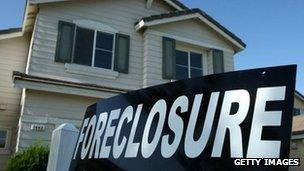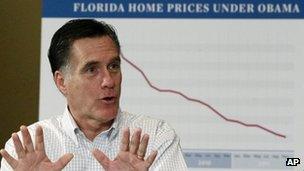Has America fallen out of love with wealth?
- Published
- comments

Florida is home to many rich and famous - but it also hosts a high foreclosure rate
The Florida island homes of the rich and often famous are a jumble of opulence, a tumble of styles ranging all the way from understated good taste to vulgarity that would make bling blush.
The water between Miami's wealthy financial district and the exuberant hedonism of South Beach is studded with a string of exclusive islets.
P Diddy's home is hidden behind a mass of tropical vegetation, but Julio Iglesias' sprawling white hacienda stands proud by the water front. An azure fantasy, bright red blooms climbing its bright blue walls, it was built for Sylvester Stallone.
But the largest house here, a white Southern mansion with twin Grecian pillars rising up to the roof, is home to a billionaire dermatologist you'll never have heard of. Elizabeth Taylor had one of her honeymoons here, Edith Piaf lived here for a while in the 50s, external, and Al Capone died here.
Florida has never had any problem with conspicuous wealth. Awe, not envy, is the prescribed emotion. America has always celebrated riches as the just reward for success. Europeans can be more nervous and more discreet, lest flaunting fortune provokes those who have none. That has rarely been a consideration in America.
But maybe the slow recovery from recession, the long erosion of middle-class incomes, has changed all that. Certainly President Barack Obama's pitch in his State of the Union speech seemed to be that the American dream was broken, that hard work no longer was rewarded - so unnamed others should be required to play by the rules and do their bit too. His opponents label this "class war".
What is more startling is the way wealth has become a weapon on the right. In Florida, in the race to become the Republican candidate to take on President Obama, Mitt Romney's wealth has been an issue.
Newt Gingrich forced Mitt Romney to publicise his tax returns, revealing the fact that he made $20m (£13m) last year in unearned income, external. Mr Gingrich's supporters funded a series of adverts labelling Mr Romney a "vulture" and "corporate raider", and accusing him of making his millions by asset-stripping and firing workers, external. He mocked Mr Romney's bank accounts in Switzerland and the Cayman Islands, external.

Both Mr Romney and Mr Gingrich have attempted to harness anger over the economy
In return, Mr Romney has mounted a blitzkrieg against Mr Gingrich, external, much of it focused on his political and personal integrity. But he has also attacked the way he has made money, external, accusing him of being a lobbyist, external.
So is being rich now a negative even in a race on the right of politics?
Some Republicans are outraged and think that Mr Gingrich has made a big mistake. The CEO of Miami's Pacific National Bank, external, Carlos Fernadez-Guzman, is a Romney supporter and says: "The foundation of this country is a free market system. It is a system where you attempt to earn as much as you can within the legal bounds. For God's sake, most people want to be Mitt Romney, earning $20m a year. I don't understand the basis for the criticism in this society."
I say that the suggestion is he made it on other people's backs.
"When you look at private equity the whole concept is survival of the fittest in the enterprise world. Companies do make it, and some don't."
He admits it can be uncomfortable being a banker at the moment.
"It is a mood in the country and it is understandable. There have been excesses. There have been situations that have to be looked at. But that is not something you overcome by severe regulations - you allow the market to take care of those issues."
Many in Florida, as across the United States, feel betrayed by the system. In this state, incomes rose as new properties sprouted out of the ground, but now one in every 360 homes is in foreclosure. Houses prices have plummeted. Even on the Island of the Stars the price of one property is slashed - from $35m to a meagre $17m. There seems no end in sight, external.
Newt Gingrich is an angry politician and he's picking up on a sense of resentment, that some of the elite (a favourite word in America at the moment) have escaped crash and crisis - and indeed have made money out of it.
A few blocks from South Beach's Ocean Drive, a construction worker called Joseph is packing up for the day. He's a Republican but isn't happy with any of the candidates. He says he isn't bothered by Mr Romney's wealth but doesn't like him.
"He ain't the squirrel that gets the nuts. He gets somebody else to do that for him." He says good candidates haven't come forward because they haven't got enough money.
Joseph is way beyond fed up.
"There's way too much greed. They're making money and making money and making money. I make holes in the ground and struggle for my money. I feel left out - I feel super left out. I find it hard to live.
"This isn't America. I am an American citizen. I ain't supposed to have to go and ask for help. I am working at a job 12 hours a day but there's nothing but obstacles and struggle. I am bankrupt and halfway homeless."
Mr Gingrich's attacks have not stopped Mr Romney surging ahead, external, and that may tell you something.
The Island of the Stars is not going to be stormed by a mob, but there is a deep, inchoate, slow-burning anger in America. The Tea Party and Occupy Wall Street have both tapped into that - but so far no politician has harnessed its power.
- Published26 January 2012

- Published13 January 2012

- Published5 January 2012